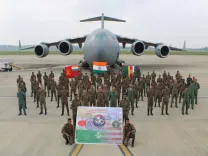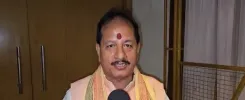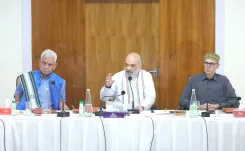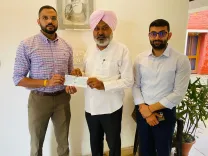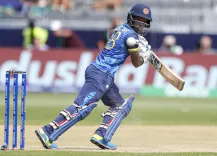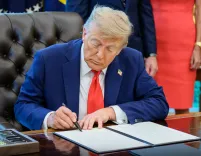Should We Read the Judgment Before Commenting? Sudershan Reddy's Response to Amit Shah's 'Naxalism' Allegation
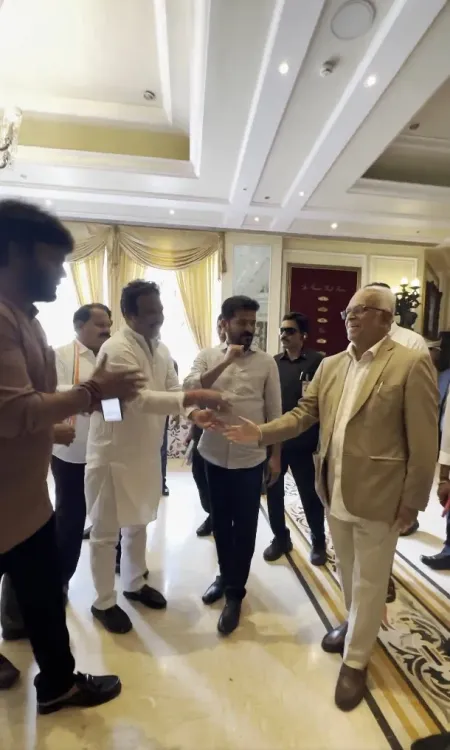
Synopsis
Key Takeaways
- Importance of reading Supreme Court judgments
- Justice Reddy's long-standing commitment to the Constitution
- Need for open dialogue in political discourse
- Concerns over electoral integrity
- Civil liberties and social justice advocacy
Hyderabad, Sep 1 (NationPress) One must thoroughly examine the Supreme Court ruling before forming an opinion on it, asserted Justice B. Sudershan Reddy (retd), the INDIA bloc's Vice-Presidential candidate and a former judge of the apex court, in reaction to Union Home Minister Amit Shah's recent assertion that he endorsed "Naxalism (Maoism)".
Shah made this claim last week while discussing the 2011 Salwa Judum ruling authored by Justice Reddy.
"If you wish to comment on the Supreme Court ruling, please read it first. It’s an official Supreme Court ruling. Notably, I was the author. Following my judgment, 11 judges reviewed the case, and not a single word, period, comma, or semicolon has been altered," Justice Reddy stated, indirectly referencing Shah.
During his address at an event hosted by the Congress, which was attended by Chief Minister A. Revanth Reddy, party MPs, MLAs, MLCs, and leaders from the Communist Party of India (CPI), Sudershan Reddy noted that a discussion surrounding the ruling had commenced, and he was invited to participate. "They presumed I would be intimidated and withdraw, but I’m ready to confront the challenge and engage in dialogue with them," he declared.
"Dialogue is essential, but I have a request: please read the judgment. If I have advocated for anyone anywhere, I will humbly accept your claim," he added.
He emphasized that his involvement in this matter is part of his longstanding journey with the Constitution. "I have been committed to the Constitution of India for 53 years. This is an extension of that journey, as the Vice-President's role is not a political one," he explained.
Having taken the oath five times to uphold the Constitution, he reiterated that he pledged to maintain true faith and allegiance to it.
"The President and Vice-President are required to swear that they will defend and uphold the Constitution of India as established by law," he stated.
Sudershan Reddy affirmed that there has been no interruption in his journey, clarifying that he has not entered politics. "I am not affiliated with any political party and have no intention of joining one in the future," he stated.
However, he noted that it would be inaccurate to label him as apolitical, as every citizen who pledges allegiance to the Constitution and participates in elections possesses some political perspective.
"As a citizen, I have voted in every election, and as a member of a civilized society, I address various societal issues. I express my opinions on civil liberties, social justice, and the directive principles set forth in the Constitution," he remarked.
"Someone asked me in Delhi about the labels being placed on me. I responded, ‘Read the Directive Principles of the Constitution.’ Governments that implement these principles and the policies they create align with that philosophy, and I identify with it," he said.
He indicated that governments are responsible for enforcing Directive Principles, which advocate for policies that prevent resource concentration and promote gender equality.
"If advocating for the implementation of the Directive Principles and discussing them leads to being labeled, then I am not offended by it," he stated.
Sudershan Reddy questioned why NDA candidate C. P. Radhakrishnan was absent from a constitutional debate with him.
"I’m unsure of the other candidate's whereabouts. I engage with the media, friends, and newspapers daily... If he had also participated, we could have enjoyed a constructive debate," he mentioned.
Commenting on the Special Intensive Revision (SIR) of electoral rolls in Bihar, he expressed concerns over the integrity of the electoral process in the nation.
Pointing out flaws in the Election Commission of India's methods, he cautioned that if these practices persist, democracy could be at risk. He recalled that when the voter list was established a month after independence, individuals became voters first and citizens later.
"How can democracy thrive if the voter list is created based on arbitrary decisions?" he questioned, labeling it a serious matter.
Sudershan Reddy remarked that laws or rules shouldn’t be enacted merely because the ruling party holds a majority. "We do not operate as a majoritarian state. Our society is multilingual, multicultural, and multi-religious. The Constitution does not grant power to anyone; its purpose is to limit power," he asserted.
In response to Chief Minister Revanth Reddy's concerns about attempts to alter the Constitution, Sudershan Reddy stated that the Constitution could be undermined without being completely rewritten. He recalled Dr. B. R. Ambedkar's words that, regardless of how commendable a constitution may be, if those implementing it are inadequate, it will ultimately fail.

